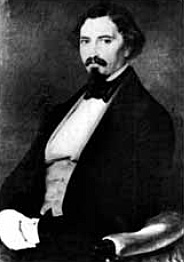Carlo Guasco
13 March 1813 Solero – 13 December 1876 Solero

Guasco's musical talent was already evident in childhood (he played several instruments), but for his studies in Alessandria,
he chose literature first and then mathematics, specializing in geometry and eventually becoming an surveyor. A relative, who
was a piano teacher, discovered his voice, and he went to Milano and had his voice trained by composer Giacomo Panizza, just
for a few months though.
Guasco made his debut as the Fisherman in Guillaume Tell at La Scala in 1837, and was an immediate success. One of his
generations foremost tenors, he premiered, among others, three Verdi operas (Lombardi, Ernani and Attila), although the Ernani
premiere was a failure, as far as Guasco was concerned. He considered the role too heavy for his voice, had (unsuccessfully)
tried to withdraw from the production already a few weeks earlier, and in the premiere, he was completely hoarse all the
evening. Later on, however, he grew into the role, and became famous for it.
From 1848 to 1850, he withdraw from the stage, not because of any vocal problems; it seems that he just had his share of it.
He resurfaced in 1851 in Paris and London, sang "his" Ernani at the Paris Théâtre-Italien in 1852, and was very
successful in Vienna in 1853. Then he retired definitely, while in full possession of his voice. He bequeathed large parts of
his considerable fortune on his native town of Solero, for the construction of an orphanage, and for university scholarships.
Reference 1: Kutsch & Riemens; reference 2
and picture source
Repertory
Guillaume Tell (Ruodi) – Milano, Scala, 26 December 1836
Il turco in Italia – Milano, Canobbiana, 27 April 1837
L'ammalata ed il consulto (Manusardi, composer) – Milano, Canobbiana, 24 June 1837
Il pirata – Nice, September 1837
Il barbiere di Siviglia – Nice, Septembre 1837
La pazza per amore (Coppola, composer) – Nice, 1837
Mosè (Amenofi) – Nice, 26 December 1837
Norma – Nice, January 1838
La Cenerentola – Nice, January 1838
Belisario – Nice, January 1838
Otello (Otello) – Nice, 7 January 1838
Gli esposti (Luigi Ricci, composer) – Nice, 1838
L'inganno felice – Nice, 1838
Il pirata – Marseille, Grand Théâtre, April 1838
I Capuleti e i Montecchi (Tebaldo) – Marseille, Grand Théâtre, June 1838
Ines de Castro (Persiani, composer) – Marseille, Grand Théâtre, 1838
Beatrice di Tenda – Pavia, Compadroni, 19 September 1838
Marin Faliero – Piacenza, Municipale, 26 December 1838
Elena da Feltre (Ubaldo) – Reggio Emilia, Comunale, 30 April 1839
Lucia di Lammermoor – Reggio Emilia, Comunale, 25 June 1839
Lucrezia Borgia – Udine, 20 July 1839
Gemma di Vergy – Udine, 10 August 1839
Elena e Claudio – Roma, Valle, 26 December 1839
Matilde di Shabran – Roma, Valle, January 1840
Maria Stuarda – Ancona, Muse, 3 May 1840
I due Figaro (Speranza, composer) – Trieste, Grande, 26 December 1840
Il giuramento – Trieste, Grande, 20 January 1841
Rolla (Mabellini, composer) – Trieste, Grande, 23 March 1841
La vestale (Mercadante, composer) – Milano, Scala, 10 August 1841
Caterina di Cleves (Savi, composer) – Milano, Scala, 22 September 1841
Le nozze di Figaro (Luigi Ricci, composer) – Milano, Scala, 26 October 1841
Corrado d'Altamura (Federico Ricci, composer) – Milano, Scala, 16 November 1841 (world premiere)
Ildegonda e Rizzardo (Graffigna, composer) – Milano, Scala, 3 December 1841
Il templario (Nicolai, composer) – Verona, Filarmonico, 26 December 1841
Saffo – Verona, Filarmonico, January 1842
Galeotto Manfredi (Hermann, composer) – Verona, Filarmonico, 23 February 1842
Torquato Tasso – London, Her Majesty's, 30 March 1842
Bianca di Belmonte (Imperatori, composer) – Milano, Scala, 22 November 1842
Vallombra (Frederico Ricci, composer) – Milano, Scala, 26 December 1842
I lombardi alla prima crociata (Oronte) – Milano, Scala, 11 February 1843 (world premiere)
Maria di Rohan – Wien, Kärntnertortheater, 5 June 1843 (world premiere)
Fausta – Bergamo, Riccardi, August 1843
Anna Bolena – Bergamo, Riccardi, 31 August 1843
Linda di Chamounix – Trieste, Grande, 30 September 1843
Il reggente – Trieste, Grande, 11 November 1843
Giovanna I di Napoli (Coppola, composer) – Torino, Regio, January 1844
Ernani – Venezia, Fenice, 9 March 1844 (world premiere)
Ermengarda (Sanelli, composer) – Milano, Scala, 10 November 1844
I Luna e i Perello (Bona, composer) – Milano, Scala, 26 November 1844
I fidanzati di Sicilia (Gastaldi, composer) – Madrid, Cruz, April 1845
Giovanna d'Arco – Venezia, Fenice, 26 December 1845
Adelia – Venezia, Fenice, 29 January 1846
La sposa d'Abido (Poniatowski, composer) – Venezia, Fenice, 28 February 1846 (world premiere)
Attila – Venezia, Fenice, 17 March 1846 (world premiere)
La regina di Cipro – Ferrara, Comunale, 26 April 1846
Malek Adel (Poniatowski, composer) – Venezia, Fenice, 20 June 1846 (world premiere)
I due Foscari – St. Petersburg, Imperiale, 20 January 1847
Guillaume Tell – St. Petersburg, Imperiale, January 1847
Reference: Carlo Guasco, tenore romantico fra mito e realtà, edito con il patrocinio della Cassa di Risparmio di Alessandria, 1976
Reference: Giorgio Appolonia: Carlo Guasco, un tenore per Verdi, EDA, Torino, 2001
|
